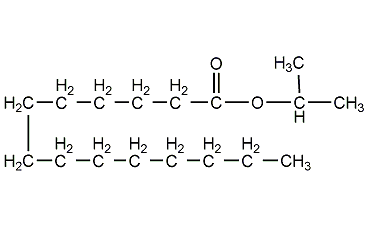Isopropyl tetradecanoate Isopropyl tetradecanoate


Structural formula
| Business number | 030X |
|---|---|
| Molecular formula | C17H34O2 |
| Molecular weight | 270.45 |
| label |
Isopropyl myristate, Isopropyl myristate, nonionic surfactants, Dispersant, perfume fixative, Emulsifiers for cosmetics |
Numbering system
CAS number:110-27-0
MDL number:MFCD00008982
EINECS number:203-751-4
RTECS number:XB8600000
BRN number:1781127
PubChem number:24896567
Physical property data
1. Properties: Colorless and odorless liquid, which can be mixed with vegetable oil in any proportion to form a transparent form. It is not easy to be hydrolyzed and rancid.
2. Relative density (g/mL, 20/4℃): 0.8532
3. Relative density (25℃, 4℃): 0.794298.9
4. Melting point (ºC): 6
5. Boiling point (ºC, 2.666kPa): 193
6. Boiling point (ºC): 192.620
7. Refractive index (20ºC): 1.4340
8. Flash point (ºC): 110
9. Refraction at room temperature Rate (n25): 1.4325
10. Autoignition point or ignition temperature (ºC): Undetermined
11. Vapor pressure (mmHg, 25ºC ): Undetermined
12. Saturated vapor pressure (kPa, ºC): Undetermined
13. Heat of combustion (KJ/mol): Undetermined
14. Critical temperature (ºC): Undetermined
15. Critical pressure (KPa): Undetermined
16. Log value of oil-water (octanol/water) partition coefficient: Undetermined Determined
17. Explosion upper limit (%, V/V): Undetermined
18. Explosion lower limit (%, V/V): Undetermined
19. Solubility: Soluble in ether, ethanol, and chloroform, with good lubricity.
Toxicological data
1. Irritation: Human skin standard Drez eye dye test: 85mg/3D Mild irritation.
Rat skin standard Drez eye dye test: 100mg/24H Mild irritation.
Rabbit skin standard Drez eye dye test: 426mg/24H Mild irritation.
Rabbit skin standard Drez eye dye test: 100mg/24H severe irritation.
Guinea pig skin standard Drez eye dye test: 100mg/24H moderate irritation.
2. Acute toxicity: Rat passage LDLO:> 16GM/KG; rats inhaled LC:> 41gm/M3/1h
Rat abdominal cavity LD50:> 79500mg/kg ;SmallLC50: 49700mg/kg
LC50:> 50200mg/kg of mice; rabbit skin LD50: 5gm/kg
Guinea Rat LD50:> 25ml/kg </
3. Irritating to eyes and skin.
Ecological data
This substance is not harmful to water bodies.
Molecular structure data
1. Molar refractive index: 82.54
2. Molar volume (cm3/mol): 313.0
3. Isotonic specific volume (90.2K ): 730.6
4. Surface tension (dyne/cm): 29.6
5. Polarizability (10-24cm3): 32.72
Compute chemical data
1. Reference value for hydrophobic parameter calculation (XlogP): 7.2
2. Number of hydrogen bond donors: 0
3. Number of hydrogen bond acceptors: 2
4. Number of rotatable chemical bonds: 14
5. Number of tautomers: none
6. Topological molecule polar surface area 26.3
7. Number of heavy atoms: 19
8. Surface charge: 0
9. Complexity: 199
10. Number of isotope atoms: 0
11. Determine the number of atomic stereocenters: 0
12. Uncertain number of atomic stereocenters: 0
13. Determine the number of chemical bond stereocenters: 0
14. Number of uncertain chemical bond stereocenters: 0
15. Number of covalent bond units: 1
Properties and stability
1. It does not decompose under normal temperature and pressure, avoid contact with oxides. Colorless to light yellow transparent liquid, not easily hydrolyzed and rancid.
2. Good permeability, smooth and non-greasy on the skin. Toxicity is non-toxic and has low irritation. It is flammable and can cause combustion when exposed to open flames or high heat.
Storage method
Save in sealed format. Store in a cool, dry place. Store away from oxidizing agents.
Synthesis method
1. Obtained from the esterification of myristic acid obtained by re-evaporating coconut oil and isopropyl alcohol.
2. Add 200 kg tetradecanoic acid and 450 kg isopropanol into the reaction kettle in sequence, add 360 kg (98%) sulfuric acid after mixing, heat to reflux for 10 hours, recover the isopropyl alcohol, and use ice Wash the acid with water, neutralize it with 10% Na2CO3 aqueous solution, steam isopropyl alcohol and water under normal pressure, and steam out the product under reduced pressure. 185 ℃/2.0 kPa~195 ℃/2.7 kPa.
3. Add 90 kg of isopropyl alcohol into the reactor, and then add sulfuric acid equivalent to 5% of the total input as a catalyst. Slowly add 228 kg of tetradecanoic acid under stirring, heat to reflux, and continuously separate water. After the reaction until no water separates, cool down and take a sample to measure the acid value. The acid value reaches 1.5 mg KOH/g as the end point. Add alkali to neutralize, remove water under reduced pressure, and dealcoholize under reduced pressure to an acid value of 0.05 to 1.0 mg KOH/g. The finished product is the finished product.
4. Acidification method is mainly used. It is produced by separating myristic acid from coconut oleic acid and adding isopropyl alcohol for esterification.
Purpose
1. Used as a dispersant for lipstick, hair cream, lip balm, cleaning cream, fragrance powder and medical ointment. It can also be used as a fixative for perfume and in the pharmaceutical industry. Dispersants and raw materials. This product is one of the important additives in mid-to-high-end cosmetics. It has excellent penetration, moisturizing and softening effects on the skin and is used as an emulsifier and wetting agent in cosmetics.
2. Synthetic grease. Mainly used as a lubricant for emulsion cosmetics. It has good compatibility with other raw materials of cosmetics and can improve the affinity of cosmetics to the skin. Since it is slightly irritating to the skin, the dosage should not be excessive.